交际英语(翻译版)
2019年6月-精心整理-全中文翻译-交际英语

12019年6月统考-交际英语-15分1、- How are you, Bob? -你好吗, 鲍勃?2、- Hello, I'm Harry Potter. 你好, 我是哈利波特。
, 我叫查尔斯·格林, 但叫我查尔斯 _3、保罗, 谁在那边说话?- Oh, that's my father!And beside him, my mother. 哦, 那是我父亲!在他身边, 我的母亲4、- It's rather cold in here. Do you mind if I close the window? 这里相当冷。
你介意我关上窗户吗?没有关系,你随意5、- May I see your tickets, please? 我可以看一下你的票吗?当然6、- I'm sorry. I am late due to the heavy traffic. 对不起。
由于交通拥挤, 我迟到了。
好吧,没有关系7、- Could you help me with my physics, please ?你能帮我学习物理吗?对不起, 我不能。
我现在得去参加一个会议。
8、- Thank you ever so much for your lovely gift. 谢谢你送我这么可爱的礼物我很高兴你喜欢它。
9、- Could I borrow your car for a few days? 我可以借你的车几天吗?当然, 这是钥匙。
享受您的旅程。
10、- Could I speak to Don Watkins, please ?我能和唐·沃特金斯通话吗?请说吧A.Speaking, please.11、- Excuse me, how much is the jacket? 对不起, 这件夹克多少钱?这是499元。
_ 你想试穿一下吗?12、- What does Tom's wife do for a living? 汤姆的妻子是做什么的?13、- I didn't mean to do that. Please forgive me.我不是故意的。
日常英语交流口语100句中文翻译
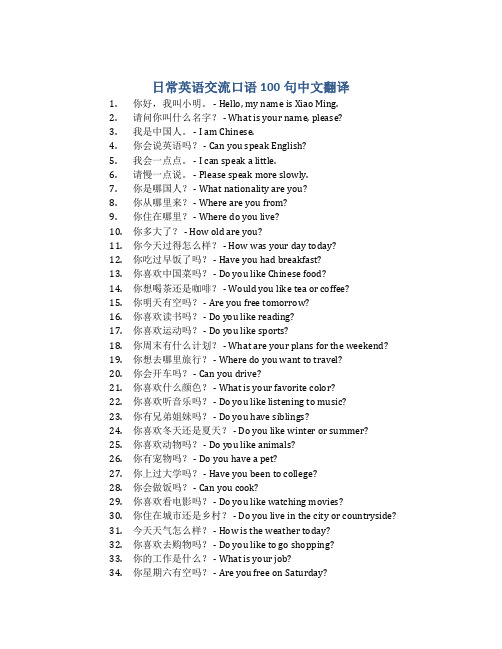
日常英语交流口语100句中文翻译1.你好,我叫小明。
- Hello, my name is Xiao Ming.2.请问你叫什么名字? - What is your name, please?3.我是中国人。
- I am Chinese.4.你会说英语吗? - Can you speak English?5.我会一点点。
- I can speak a little.6.请慢一点说。
- Please speak more slowly.7.你是哪国人? - What nationality are you?8.你从哪里来? - Where are you from?9.你住在哪里? - Where do you live?10.你多大了? - How old are you?11.你今天过得怎么样? - How was your day today?12.你吃过早饭了吗? - Have you had breakfast?13.你喜欢中国菜吗? - Do you like Chinese food?14.你想喝茶还是咖啡? - Would you like tea or coffee?15.你明天有空吗? - Are you free tomorrow?16.你喜欢读书吗? - Do you like reading?17.你喜欢运动吗? - Do you like sports?18.你周末有什么计划? - What are your plans for the weekend?19.你想去哪里旅行? - Where do you want to travel?20.你会开车吗? - Can you drive?21.你喜欢什么颜色? - What is your favorite color?22.你喜欢听音乐吗? - Do you like listening to music?23.你有兄弟姐妹吗? - Do you have siblings?24.你喜欢冬天还是夏天? - Do you like winter or summer?25.你喜欢动物吗? - Do you like animals?26.你有宠物吗? - Do you have a pet?27.你上过大学吗? - Have you been to college?28.你会做饭吗? - Can you cook?29.你喜欢看电影吗? - Do you like watching movies?30.你住在城市还是乡村? - Do you live in the city or countryside?31.今天天气怎么样? - How is the weather today?32.你喜欢去购物吗? - Do you like to go shopping?33.你的工作是什么? - What is your job?34.你星期六有空吗? - Are you free on Saturday?35.你喜欢喝啤酒吗? - Do you like to drink beer?36.你喜欢喝茶呢还是咖啡? - Do you prefer tea or coffee?37.你爱吃巧克力吗? - Do you love to eat chocolate?38.你今天心情怎么样? - How are you feeling today?39.你的朋友喜欢运动吗? - Do your friends like sports?40.你想去旅行吗? - Do you want to travel?41.你喜欢看书吗? - Do you like reading books?42.你今晚过得如何? - How was your evening?43.你喜欢喝咖啡吗? - Do you like to drink coffee?44.你明天有什么计划? - What are your plans for tomorrow?45.你想去看电影吗? - Do you want to go watch a movie?46.你会游泳吗? - Can you swim?47.你喜欢吃西餐还是中餐? - Do you prefer Western or Chinese food?48.你家有几口人? - How many people are in your family?49.你的生日是几月几日? - What is your birthday?50.你会弹吉他吗? - Can you play the guitar?51.你星期天有空吗? - Are you free on Sunday?52.你喜欢去海边吗? - Do you like to go to the beach?53.你喜欢喝果汁吗? - Do you like to drink juice?54.你的假期计划是什么? - What are your holiday plans?55.你喜欢看足球比赛吗? - Do you like watching football matches?56.你会滑雪吗? - Can you ski?57.你上班要坐公交车吗? - Do you take a bus to work?58.你愿意跟我一起去看电影吗? - Would you like to go watch a movie with me?59.你想喝茶还是咖啡? - Would you like tea or coffee?60.你周末喜欢做什么? - What do you like to do on weekends?61.你刚才在干什么? - What were you doing just now?62.你喜欢在家还是外面吃饭? - Do you like to eat at home or outside?63.你今天有什么计划? - What are your plans for today?64.你工作很忙吗? - Are you busy with your work?65.你愿意和我一起去跑步吗? - Would you like to go running with me?66.你在这里工作多久了? - How long have you been working here?67.你星期一有空吗? - Are you free on Monday?68.你星期三有什么安排? - What are your plans for Wednesday?69.你住在哪个城市? - In which city do you live?70.你想喝热巧克力还是冰巧克力? - Do you want hot chocolate or iced chocolate?71.你喜欢去野餐吗? - Do you like to go for a picnic?72.你今天打算做什么? - What do you plan to do today?73.你多长时间回家一次? - How often do you go home?74.你愿意和我一起参加派对吗? - Would you like to join the party with me?75.你的家乡是一个大城市吗? - Is your hometown a big city?76.你住在城市中心还是郊区? - Do you live in the city center or suburbs?77.你们家有车吗? - Does your family have a car?78.你想买一件什么衣服? - What kind of clothes do you want to buy?79.你希望更多时间陪家人吗? - Do you wish for more time with family?80.你习惯早起吗? - Are you used to getting up early?81.你的朋友喜欢喝酒吗? - Do your friends like to drink?82.你想出国留学吗? - Do you want to study abroad?83.你每天都做运动吗? - Do you exercise every day?84.你今天下午有什么计划? - What are your plans for this afternoon?85.你喜欢喝饮料还是牛奶? - Do you prefer drinks or milk?86.你的手机是哪个牌子的? - Which brand is your phone?87.你喜欢看电视剧吗? - Do you like to watch TV dramas?88.你会弹钢琴吗? - Can you play the piano?89.你妈妈是做什么工作的? - What does your mom do for work?90.你有兴趣学习新技能吗? - Are you interested in learning new skills?91.你想尝试一些新的餐馆吗? - Do you want to try some new restaurants?92.你最喜欢哪个季节? - Which season do you like the most?93.你愿意尝试一些新的运动吗? - Would you be willing to try some new sports?94.你的家乡是一个热闹的地方吗? - Is your hometown a lively place?95.你住在学校宿舍吗? - Do you live in a school dormitory?96.你通常在周末做什么? - What do you usually do on weekends?97.你帮家里做家务吗? - Do you help with household chores at home?98.你喜欢旅行还是呆在家里? - Do you like to travel or stay at home?99.你喜欢参加聚会吗? - Do you like to attend parties?100.你觉得现在怎么样? - How do you feel right now?以上是日常英语交流口语100句中文翻译,希望对你有所帮助。
交际英语 英语打电话的几种说法
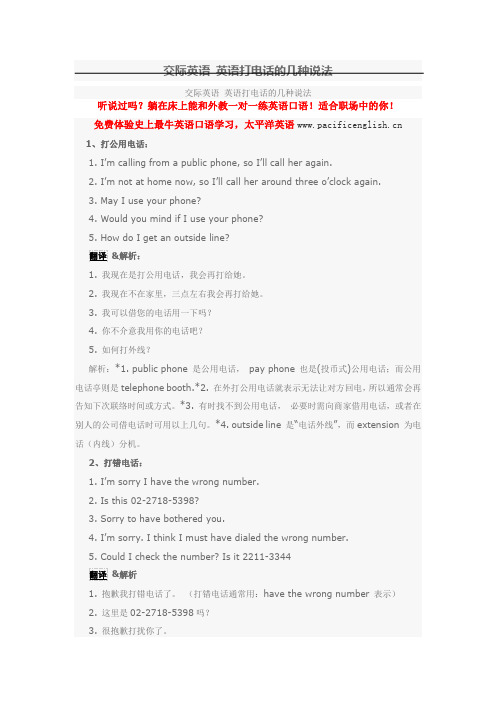
交际英语英语打电话的几种说法听说过吗?躺在床上能和外教一对一练英语口语!适合职场中的你!免费体验史上最牛英语口语学习,太平洋英语1、打公用电话:1. I’m calling from a public phone, so I’ll call her again.2. I’m not at home now, so I’ll call her around three o’clock again.3. May I use your phone?4. Would you mind if I use your phone?5. How do I get an outside line?翻译&解析:1. 我现在是打公用电话,我会再打给她。
2. 我现在不在家里,三点左右我会再打给她。
3. 我可以借您的电话用一下吗?4. 你不介意我用你的电话吧?5. 如何打外线?解析:*1. public phone 是公用电话,pay phone 也是(投币式)公用电话;而公用电话亭则是telephone booth.*2. 在外打公用电话就表示无法让对方回电,所以通常会再告知下次联络时间或方式。
*3. 有时找不到公用电话,必要时需向商家借用电话,或者在别人的公司借电话时可用以上几句。
*4. outside line 是“电话外线”,而extension 为电话(内线)分机。
2、打错电话:1. I’m sorry I have the wrong number.2. Is this 02-2718-5398?3. Sorry to have bothered you.4. I’m sorry. I think I must have dialed the wrong number.5. Could I check the number? Is it 2211-3344翻译&解析1. 抱歉我打错电话了。
(打错电话通常用:have the wrong number 表示)2. 这里是02-2718-5398吗?3. 很抱歉打扰你了。
2014年大学英语大学英语交际英语_统考英语b全中文翻译

2014年大学英语b统考阅读理解全翻译版Everyone knows what a needle is. Of course there are needles for sewing machines, needles for injection, you name it. But few people think of the wonder a needle works in the hands of those who practice acupuncture.During the past ten years of so, I have been suffering from a terrible headache. It seems to be getting from bad to worse these days. Last night I got a sudden pain in my head. It was so terrible that I could hardly bear it. Although I swallowed all kinds of pain-killers, I didn't feel any better. It seemed that there was nothing I could do but phone for a doctor.One of our neighbors happened to be with us. He was not a doctor, but he timidly offered his help, saying "Do you mind if I tried acupuncture on you? These needles may possibly do you some good." I agreed. In a moment, he had taken out a few needles from his purse. Without a moment's delay, he fixed a few needles into the skin on my head here and there. Before long, I felt thoroughly relieved.Just then, the doctor sped through my house and said,"Where is our patient?""Sorry, Doctor, You are too late. It's killed!" I answered in delight.It's a miracle, isn't it?每个人都知道针是什么,当然,这里有缝东西的针,也有注射的针,等等你能叫出的,但是在一些特别人的手中,针可以用来做针灸。
交际翻译举例

交际翻译举例交际翻译,也称为口译,是一种翻译技术,指的是将一门语言的口头表达方式,通过另一门语言的口头翻译表达出来。
交际翻译因其“具有交流性”的特点,可以在不同的地区、不同的社会文化之间架起桥梁,让不同的语言传播,促进文化交流,对人们的交流与沟通有着至关重要的作用。
以下是交际翻译的举例:一、聚会例如:一个中国朋友向一个美国朋友说:“周六晚上我们一起聚会吧。
”翻译成英文则为:“Let’s get together on Saturday night.”二、购物例如:一个日本朋友向一个英国朋友说:“今天去购物,一起来吗?”翻译成英文则为:“Do you want to go shopping with me today?”三、拜访例如:一个印度朋友向一个法国朋友说:“下个月我会去巴黎,你有空来拜访我吗?”翻译成英文则为:“Are you free to visit me when I in Paris next month?”四、邀请例如:一个意大利朋友向一个瑞典朋友说:“这个月末,你来我家做客吧。
”翻译成英文则为:“Come to my house for a visit at the end of this month.”以上就是交际翻译的举例。
交际翻译的这种特点是弥补了传统翻译所不及的,为推动文化交流提供了可能,让不同语言之间的沟通和交流得以实现,从而促进人们之间的拉近。
因此,为了更好的推动文化的融合,促进民众的交流,学好交际翻译和口译技能,是每一个人都应该奋斗的方向,也是我们每个人应该努力去实践的。
交际翻译需要专业技能,也舍不得少了经验积累。
翻译人员需要掌握双方语言,并且需要把握两种文化中的差异,从而找出翻译中最合适的表达,这就需要翻译者细心选择恰当的表达,不能混淆客观事实,也不能有翻译失误,而且要能够把握机会,快速、准确地翻译。
此外,翻译人员还应该熟知目标语言的表达习惯及词汇,抓住两种语言之间的联系,从而达到真正的精准翻译,确保把源文的意思完整、准确的传达开来。
大学英语B网考(第1部分)交际英语(翻译版).

第一部分交际英语(2011年12月网考翻译版1.--Have a cup of tea, ________ ? --Thanks a lot. 你需要来杯茶吗?--非常感谢。
A don’t youB haven’t youC shall meD will you2.-- ________? --He is not very well. 他怎么样?他不是很好。
A Who is heB What is heC How is heD Who he is3.—Why didn’t you co me to my birthday party yesterday?-- ________.昨天为什么不来参加我的生日晚会?不好意思,我太太出了个交通事故A Excuse me, my friend sent me a flowerB Fine, I never go to birthday partiesC Well, I don’t like birthday partiesD Sorry, but my wife had a car accident4.—This box is too heavy for me to carry upstairs. 这个盒子对我来说太重了,搬不到楼上去--_______--让我帮你吧A You may ask for helpB I’ll give you a handC Please do me a favorD I’d come to help5. -Could I ask you a rather personal question? 我可以问您一个私人问题吗?-Of course, _________.当然可以,开始A good ideaB that’s rightC never mindD go aheadKey: DCDBD6.—Oh, dear! I’ve just broken a window..噢天啊,我刚刚打破了一扇窗户。
跨文化交际英语阅读教程课文翻译

跨文化交际英语-阅读教程课文翻译———————————————————————————————————————————————————————————————— 作者作者: : ———————————————————————————————————————————————————————————————— 日期日期: :第一单元现代社会依赖于技术创新现代社会依赖于技术创新,,而技术创新须依靠知识产权来保障。
越来越多的国家遵守国际条约,越来越多的国家遵守国际条约,实行知识产权保护。
实行知识产权保护。
但这方面做得还远远不够。
我们来回顾一下过去,看看缺乏知识产权保护会导致什么样的后果样的后果,,从而吸取教训。
许多西方公司付出了惨痛的代价才发现,知识产权保障机制还未健全时健全时,,在东南亚投资无异于将钱付诸东流。
要进入这些市场,西方公司不仅必须向相关当局说明他们的产品公司不仅必须向相关当局说明他们的产品,,而且还要说明他们产品的制作过程。
而结果经常是本该受到知识产权保护的产品很快被无耻地抄袭。
盗用知识产权的例子不胜枚举。
盗用知识产权的例子不胜枚举。
例如,例如,美国化学制品巨头杜邦向一亚洲国家引进了一种名叫 Londax 的著名除草剂的著名除草剂,,用来除掉稻田里的杂草。
该公司在该产品的研发上投资了数百万美元,该公司在该产品的研发上投资了数百万美元,而且又投入了而且又投入了2500万美元在当地开设了一家生产厂家。
然而,不到一年以后,一瓶瓶非常廉价的冒牌 Lond ax公然上市了。
冒牌产品和正宗产品除了价格外的唯一区别是冒牌产品的名称是Ron dex ,用的是蓝色瓶而不是正宗产品用的绿色瓶。
瓶而不是正宗产品用的绿色瓶。
但是,但是,由于冒牌产品的价格比正宗产品的价格低廉许多,它成功毁掉了杜邦公司的投资。
它成功毁掉了杜邦公司的投资。
同时它也使得该同时它也使得该公司不再愿意投资于新化学制品的研发。
生产Lon dax 的配方本应该被当作是杜邦公司的知识产权。
新编跨文化交际英语教程(许力生) 课后翻译

1.纵观历史,我们可以清楚地看到,各民族与文化由于彼此所处地域、意识形态、容貌服饰和行为举止上存在的差异,而长久无法互相理解,无法和睦相处。
在这种情况下,跨文化交际作为一个特定的研究领域得以形成和发展。
值得注意的是,人类文明在发展过程中所遭受的许多挫折,既是个人的,又是全球性的;人类历史进程总是充满了个人间的直接冲突和民族间的误解--从骂骂咧咧到孤立主义甚至到武装冲突,大大小小争端不绝。
很显然,文化间以及亚文化间的交往日益增多,这迫切要求我们共同努力,去理解与我们有着天壤之别信仰和文化背景的人们,并与之和睦相处。
通过加深认识和理解,我们能够与生活方式、价值观念不同的人们和平共处;这不但有益于我们周遭环境的安定,也是维护世界和平的决定性因素。
2.文化有时候被称为我们的心智程序,也即我们“头脑的软件”。
但是,我们可以进一步引申这个用电脑所做的类比,把文化看作是支持软件运行的操作环境。
文化就像电脑使用的DOS或者Unix或者“视窗”(Windows)等操作系统一样,使我们能在各种各样的实际应用中处理信息。
用“视窗”这个比喻来描述文化似乎也很有吸引力。
文化就是我们心灵的视窗,透过它我们可以审视生活的方方面面。
一个社会中不同个体的视窗是大不一样的,但都有着一些重要的共同特征。
文化就好像是鱼畅游于其中的水一般,人们想当然地把文化看成是客观存在的事实,从而很少去研究它。
文化存在于我们所呼吸的空气之中,文化对我们了解自我是必不可少的,就正如生命离不开空气一样。
文化是特定群体的共有财产,而不单是个体的特征。
社会按照文化设定的程序来运作,这种程序来自于相似的生活体验以及对这种生活体验之涵义的相似性阐释。
如果文化是一种心智程序,那么它也是现实的心灵地图。
从我们很小的时候开始,文化就告诉我们应该看重什么、偏好什么、规避什么以及做些什么。
文化还告诉我们事物应该是什么样的。
文化为我们提供超越个体经验的理想典范,帮助我们决定应该优先考虑什么。
社交的英语单词

社交的英语单词英文原文:Socialize1.“社交”用英语怎么说?社交的英语是social比如:社交网social networkssocial worker 社会工作者社交聚会social gatherings2.社交的英文名词是什么呢?socialization 是社交的名词social 是社会的social munication是社会交流3.社交的英文是什么?social intercourse;social contact;gam;sociality ;4.社交的英文怎么说?社交social intercourse social contact;5.社交网络的英文是什么?社交网络即社交网络服务,源自英文SNS(Social Network Service)的翻译,中文直译为社会性网络服务或社会化网络服务畅意译为社交网络服务。
中文的网络含义包括硬件、软件、服务及应用,由于四字构成的词组更符合中国人的构词习惯,因此人们习惯上用社交网络来代指SNS (Social Network Service)。
社交网络源自网络社交,网络社交的起点是电子邮件。
互联网本质上就是计算机之间的联网,早期的E-mail 解决了远程的邮件传输的问题,至今它也是互联网上最普及的应用,同时它也是网络社交的起点。
BBS则更进了一步,把“群发”和“转发”常态化,理论上实现了向所有人发布信息并讨论话题的功能(疆界是BBS的访问者数量)。
BBS把网络社交推进了一步,从单纯的点对点交流的成本降低,推进到了点对面交流成本的降低。
即时通信(IM)和博客(Blog)更像是前面两个社交工具的升级版本,前者提高了即时效果(传输速度)和同时交流能力(并行处理);后者则开始体现社会学和心理学的理论――信息发布节点开始体现越来越强的个体意识,因为在时间维度上的分散信息开始可以被聚合,进而成为信息发布节点的“形象”和“性格”。
比如从RSS、、flickr到最近的YouTube、Digg、Mini-feed、Twitter、Fexion、Video-Mail都解决或改进了单一功能,是丰富网络社交的工具。
跨文化商务交际英语unit 1 text1-Culture and communication参考译文(英汉对照版彭炳铭)

Text 1 Culture and Communication 文化与交际(翻译官:彭炳铭2019.9.20.)Paragraph 1.The term “culture” comes from anthropologists’ studies of human societies. 文化这一术语出自人类学家对人类社会的研究。
Culture is the particular configuration of behaviors, norms, attitudes, values, beliefs and basic assumptions that differ from society to society .文化是由特定行为、道德规范、态度、价值观、信仰、和基本假说等要素构成,这些要素因社会不同而不同。
This means that culture is not “objective” in the sense that phenomena in the natural world are (or seem to be ) objective.意思是:大自然的现象都是客观的,在这个意义上讲,文化就不是“客观的”。
Culture can look different depending upon who does the looking, when they look and from what direction.1/ 20文化看起来是不同的,这有赖于谁在看、何时看、从什么方向(角度)来看。
This makes culture difficult to grasp. 这就使得文化很难掌握。
Paragraph 2.Culture has been defined in many ways but a classic definition is : 文化的定义是多方面的,但有一个经典的定义是:Culture consists of patterns, explicit and implicit, of and for behavior, acquired and transmitted by symbols, constituting the distinctive achievements of human groups … the essential core of culture consists of traditional ideas and especially their attached values.”【译文】文化包含各种外显和内隐的行为模式,这些行为模式通过符号习得和传播,构成了人类群体与众不同的成就。
《新交际英语阅读教程4》参考译文U7 Economy and Trade 文章翻译
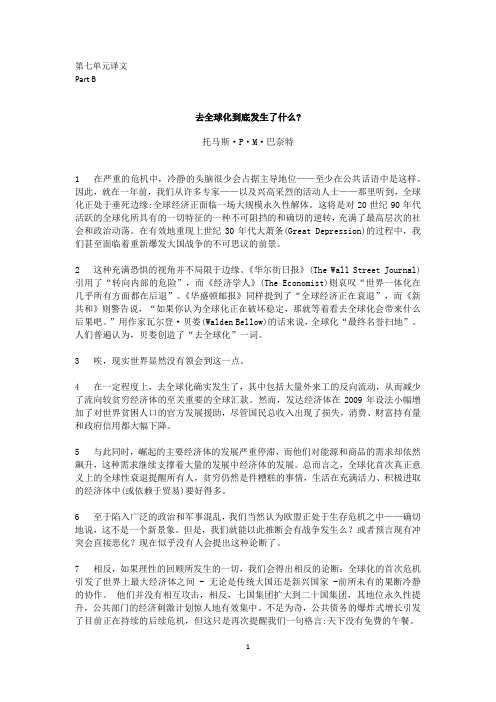
第七单元译文Part B去全球化到底发生了什么?托马斯·P·M·巴奈特1 在严重的危机中,冷静的头脑很少会占据主导地位——至少在公共话语中是这样。
因此,就在一年前,我们从许多专家——以及兴高采烈的活动人士——那里听到,全球化正处于垂死边缘:全球经济正面临一场大规模永久性解体。
这将是对20世纪90年代活跃的全球化所具有的一切特征的一种不可阻挡的和确切的逆转,充满了最高层次的社会和政治动荡。
在有效地重现上世纪30年代大萧条(Great Depression)的过程中,我们甚至面临着重新爆发大国战争的不可思议的前景。
2 这种充满恐惧的视角并不局限于边缘。
《华尔街日报》(The Wall Street Journal)引用了“转向内部的危险”,而《经济学人》(The Economist)则哀叹“世界一体化在几乎所有方面都在后退”。
《华盛顿邮报》同样提到了“全球经济正在衰退”,而《新共和》则警告说,“如果你认为全球化正在破坏稳定,那就等着看去全球化会带来什么后果吧。
”用作家瓦尔登·贝娄(Walden Bellow)的话来说,全球化“最终名誉扫地”。
人们普遍认为,贝娄创造了“去全球化”一词。
3 唉,现实世界显然没有领会到这一点。
4 在一定程度上,去全球化确实发生了,其中包括大量外来工的反向流动,从而减少了流向较贫穷经济体的至关重要的全球汇款。
然而,发达经济体在2009年设法小幅增加了对世界贫困人口的官方发展援助,尽管国民总收入出现了损失,消费、财富持有量和政府信用都大幅下降。
5 与此同时,崛起的主要经济体的发展严重停滞,而他们对能源和商品的需求却依然飙升,这种需求继续支撑着大量的发展中经济体的发展。
总而言之,全球化首次真正意义上的全球性衰退提醒所有人,贫穷仍然是件糟糕的事情,生活在充满活力、积极进取的经济体中(或依赖于贸易)要好得多。
6 至于陷入广泛的政治和军事混乱,我们当然认为欧盟正处于生存危机之中——确切地说,这不是一个新景象。
2011.12(第1部分)交际英语(翻译版)

1.--Have a cup of tea, 2.-- ________? --He is not very well.。
3.—Why didn’t you come to my birthday party yesterday? 4.—This box is too heavy for me tocarry upstairs. 5. -Could I ask you a rather personal question? Key: DCDBD6.—Oh, dear! I’ve just broken a window.7. —Sorry. I have taken your sports shoes bymistake.8. -That’s a beautiful dress you have on!9. -How do I get to the cinema?- ________10. -If you like I can mail this letter for you? Key: BCADA11. -Davidinjured his leg playing football yesterday. 12.-Must I be home before seven? 13. -Shall I drive you to the railway station?14.-I’m terribly sorry that I’ve spilledsome coffee on the carpet.15. -Hi, is Mary there, please?- ________Key: CADBA16. -It’s rather cold in here. Do you mind if I close the window? 17.-Whichsweater do you like better?18.-How clever your little son is! - ________. 19.-Medam,do all the buses go downtown?20.-Could I speak to Don Watkins,please?Key: BDCDC21.-Tomorrow is my birthday. 22.-Did you win the 100 metre race? 23.-You speak English very good.- ________. 24.-I was worried about mymaths, but Mr. Brown gave me an A. 25.-Thanks for your help. .K ey: CDCBA26.-Hello, I’m Harry Potter.27.—I’m sorry to trouble you. Can I borrow a pen,please?28. -I was born in Boston, but I studied in New York. ________?29.-Excuse me, could you show me the way to the nearest post office?30.-When are yougoing to the show?Key: CBBDD31.--We need some toothpaste.32.--I’m sorry to trouble you.33.--Unbelievable! I have failed the driving test again!34.--Excuse me,but can you tell me the way to the post office?35.--Could you help me with my physics, please?Key: BCBBDKey: DBDBA206 - Do you have any fresh fish today?207 Can I help you, sir? 208 -Could I borrow your car, please? 209 - What do you think of your new teacher? 210 Haven't seen you for ages. Let's havea get-together next week.Key: CBCDA211 Take these pills three times a day. Come back and see me in a week.—_Key: AMr. Young ran his own business and worked very hard. KEY:ABAAA A story is told about a soldier who was finally coming home KEY:ABAAB People often say thatthe Englishman's home is his castle. They mean that the home is very KEY:ABAAA In 1920, barely out of his teens, Alfred Hitchcock went to work for an Americanfilm c KEY:ABBAA We are busy talking about and using the Internet,but how many of us know the KEY:ABAAB Three men traveling on a train began a conversationabout the world's greatest wonders.KEY:AAABB The workers who brought the girl to the orphanage (孤儿院) KEY:AABBAThe French Revolution broke out in 1789. At the time France was in a crisis. CBDDD A foreigner’s first impression of the U.S. is likely to be that everyone is in arush-often under pressure.DBDACSixteen-year-old Maria was waiting in line at the airport in Santo Domingo. She was leavingDCCDABritain and France are separatedby the English Channel, a body of water that can be crossed inDDADCCommunity service is an important component of education here at our university.BCADBPaperis one of the most important products ever invented by man. Wide spread useBAABCLaws have been written to govern the use of American National Flag,andABDCAIt has been reported that in colleges across the United States, theCCDCB.This train is going _______ the tunnel quickly. 2. This room ______ cool in summer and warm in winter. It's quite comfortable to live here. 3.John succeeded _______ what he wanted. 4. I forgot to return the book to you yesterday. So I ________today..They sent the letter to me ________ mistake. KEY:BACBA6.We are disappointed to find that the quality of the products here _______ very poor.7.The twin brothers are only _______ in appearance. 8.If I don't ________ the phone home, ring me at work..As a primary school teacher, one should be ______ with children. This is the first standard for being a good teacher. 10."Town Hall is the tallest building in the city." KEY:CDDAB11.The construction of the new bridge has been ____ for two weeks because of the bad weather. 12.Who else, _______ Mary, took part in the English speech contest? 13.He has been ______ for nearly three weeks after the death of his dear pet. 14.I don't have much free time as my work _______ all my time. KEY:DAAC16.Jenny is learning Japanese. ______ her brother. 17.The rain was _______ make our picnic impossible. 18.The policeman needs to see _______ your ID card or your driver's license. 19. This is ________film I have ever seen.20.She has been working hard day and night during these years _______ she could pay for the lost necklace. KEY:ACCBA21.The new assembly line having been adopted, the factory produced ____ cars in 1999 as the year before. 22.That company doesn't take credit cards, so customers have to pay ______. 23.She is not only my classmate ________ also my good friend. 24.All the evidence points to the fact ______ he is the murderer.? 25.I shall love my country _______. KEY:CDBCB26.It is a teacher's job to make sure that everyone of his students _______ confident in preparing himself for the future. 27.On my left _______ a wide river; on my right, a dark forest. 28.Uncle Sam sent him a _______ bicycle as a birthday present.29.Either the shirts or the sweater ______ a good buy.KEY:BBDA31.Are you going to fix the car yourself, or are you going to have it _______? 32.We saw him _______ the white building and go upstairs.33.Shanghai is really a fascinating city and we've decided to stay for ______ two weeks. 35.You needn't make such a funny noise, _______? KEY:DAAC36.That was a difficult question, but Mary still _______ to work it out. 37.Listen! Who ______ in the next room? The voice is so beautiful. 38.My friend helped me _______ my cat when I was on vacation with my wife. 39.I was satisfied with her explanation, ________.40.There ________ a book and some magazines on the desk. KEY:DDCBA You'd better ______in bed. It's bad for your eyes. B John nevercomes to school late ,_____ ? AFather made his son _______ by the door. D In order to _____ your goals, you must work hard. B Where is Mr. Green? ____the library . A With a good command of reading skills,most students can manage to read______as they could the year before. D Mary told me that she _______ to the supermarket before coming home. B Modern zoos are very different from zoos that were built fifty years ago . KEY:CABED6.Mumu is a Chinese boy. But now he ___1___ in KEY:BADEC7.Water is veryimportant to living things. Without KEY:EABDC23.American people divide their days into several blocks of time, KEY:AEDCB24.This is my timetable. I study atNo.3 Middle School of Dongfang. KEY:BDEAC25.Strange things happen to time when you travel, KEY:BADCE26.Many people would agree that stress is a majorproblem in modern life. KEY:DABEC27.Traffic accidents killed more than 104,000 people in China last year. KEY:AECDB31.It seems quite clearly unjust to pay twopeople different amounts of money for KEY:BADECg Li’s(人名有可能变化,4月为:Tom’s)father has taught English here since he graduated from Peking University.王丽的父亲从北京大学毕业后就一直在这里教英语。
高中英语新课标交际口语及翻译

高中英语新课标交际口语及翻译1. 社会交往 (Social Communications)(1) 问候 (Greetings)A. Hi! 喂!你好!Hello! 喂!你好!Good morning / afternoon / evening. 上午 / 下午 / 晚上好。
How are you? 你好吗?How are you doing? 你怎么样?Please say hello to your parents. 请代我向你父母问好。
Please give my love / best wishes to Lucy. 请代我向露西问好。
B. Hi! 喂!你好!Hello! 喂!你好!Good morning / afternoon / evening. 上午 / 下午 / 晚上好。
I’m OK. 我还好。
Fine, thanks, and you? 还行,谢谢,你呢?Very well, thank you. 很好,谢谢,你呢?Just so so. 一般般,还过得去。
Sure. 当然可以。
All right. 好的,好吧。
(2) 介绍 (Introduction)A. My name is Jim. 我的名字叫吉姆。
I’m a student. 我是一名学生。
I’m from England. 我来自英国。
This is Mr. / Mrs. / Miss / Ms Brown. 这位是布朗先生 / 夫人 / 小姐 / 女士。
I’d like you to meet Bob. 我想遇见Bob。
May I introduce Professor Jeff Brown? 让我介绍一下杰夫布朗。
B. Hello! 喂!你好!How do you do? 你好!Nice / Glad / Pleased to meet (see) you. 见到你很高兴。
(3) 告别 (Farewells )A. Good-bye / Bye / Bye-bye. 再见。
新编跨文化交际英语教程1~7单元翻译
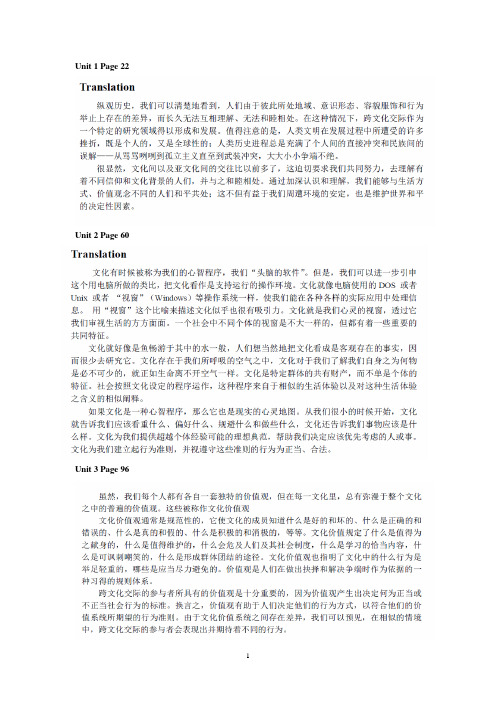
Unit 2 Page 60 Unit 3 Page 96Unit 5 Page 175 Unit 6 Page 215Case 2A common cultural misunderstanding in classes involves conflicts between what is said to be direct communication style and indirect communication style. In American culture, people tend to say what is on their minds and to mean what they say. Therefore, students in class are expected to ask questions when they need clarification. Mexican culture shares this preference of style with American culture in some situations, and that‘s why the students from Mexico readily adopted the techniques of asking questions in class. However, Korean people generally prefer indirect communication style, and therefore they tend to not say what is on their minds and to rely more on implications and inference, so as to be polite and respectful and avoid losing face through any improper verbal behavior. As is mentioned in the case, to many Koreans, numerous questions would show a disrespect for the teacher, and would also reflect that the student has not studied hard enough.Case 3The conflict here is a difference in cultural values and beliefs. In the beginning, Mary didn’t realize that her Dominican sister saw her as a member of the family, literally. In the Dominican view, family possessions are shared by everyone of the family. Luz was acting as most Dominican sisters would do in borrowing without asking every time. Once Mary understood that there was a different way of looking at this, she would become more accepting. However, she might still experience the same frustration when this happened again. She had to find ways to cope with her own emotional cultural reaction as well as her practical problem (the batteries running out).Case 6When a speaker says something to a hearer, there are at least three kinds ofmeanings involved: utterance meaning, speaker’s meaning and hearer’s meaning. In the dialogue, when Litz said ‘How long is she going to stay?’ she meant to say that if she knew how long her mother-in-law was going to stay in Finland, she would be able to make proper arrangements for her, such as taking her out to do some sightseeing. However, her mother-in-law overheard the conversation, and took Litz’s question to mean “Litz does not want me to stay for long”. From the Chinese point of view, it seems to be inappropriate for Litz to ask such a question just two days after her mother-in-law’s arrival. If she feels she has to ask the question, it would be better to ask some time later and she should not let her mother-in-law hear it.Case 7Keiko insists on giving valuable gifts to her college friends, because in countries like Japan, exchanging gifts is a strongly rooted social tradition. Should you receive a gift, and don’t have one to offer in return, you will probably create a crisis. If not as serious as a crisis, one who doesn’t offer a gift in return may be considered rude or impolite. Therefore, in Japan, gifts are a symbolic way to show appreciation, respect, gratitude and further relationship.Keiko obviously has taken those used items from Mary, Ed and Marion as gifts, for she probably doesn’t know that Americans frequently donate their used household items to church or to the community. Mary, Ed and Marion would never consider those used household items given to Keiko as gifts. No wonder they felt very uncomfortable when they received valuable gifts in return.Case 10In Japan, a company is often very much like a big family, in which the manger(s) will take good care of the employees and the employees are expected to devote themselves to the development of the company and, if it is necessary, to sacrifice their own individual interests for the interests of the company, from which, in the long run, the employees will benefit greatly. But for the French, a company is just a loosely- knit social organization wherein individuals are supposed to take care of themselves and their families. Moreover, the way the French make decisions in the family might also be different from the typical Japanese one, which may not often involve females and the power to decide usually lies with the dominating male. As there are such cultural differences between the Japanese and the French, Mr. Legrand’s decision made Mr. Tanaka feel dumbfounded.Case 12In this case, it seems that the Chinese expectations were not fulfilled. First, having two people sharing host responsibilities could be somewhat confusing to the hierarchically minded Chinese. Second, because age is often viewed as an indication of seniority, the Chinese might have considered the youth of their Canadian hosts as slight to their own status. Third, in China, it is traditional for the host to offer a welcome toast at the beginning of the meal, which is the reciprocated by the guests; by not doing so, the Canadian might be thought rude. The abrupt departure of the Chinese following the banquet was probably an indication that they were not pleased with the way they were treated. The Canadians’ lack of understanding of the Chinese culture and the Chinese ways of communication clearly cost them in their business dealings with the visiting delegation.Case 17When these two men separate, they may leave each other with very different impressions.Mr Richardson is very pleased to have made the acquaintance of Mr Chu and feels they have gotten off to a very good start. They have established their relationship on a first-name basis and Mr Chu’s smile seemed to indicate that he will be friendly and easy to do business with. Mr Richardson is particularly pleased that he had treated Mr Chu with respect for his Chinese background by calling him Hon-fai rather than using the western name, David, which seemed to him an unnecessary imposition of western culture.In contrast, Mr Chu feels quite uncomfortable with Mr Richardson. He feels it will be difficult to work with him, and that Mr Richardson might be rather insensitive to cultural differences. He is particularly bothered that, instead of calling him David or Mr Chu, Mr Richardson used his given name, Hon-fai, the name rarely used by anyone, in fact. It was this embarrassment which caused him to smile. He would feel more comfortable if they called each other Mr Chu and Mr Richardson. Nevertheless, when he was away at school in North America he learned that Americans feel uncomfortable calling people Mr for any extended period of time. His solution was to adopt a western name. He chose David for use in such situations.Case 19Talking about what’s wrong is not easy for people in any culture, but people in high-context countries like China put high priority on keeping harmony, preventing anyone from losing face, and nurturing the relationship. It seems that Ron Kelly had to learn a different way of sending message when he was in China. At home in Canada he would have gone directly to the point. But in China, going directly to the problem with someone may suggest that he or she has failed to live up to his or her responsibility and the honor of his or her organization is in question. In high-context cultures like China, such a message is serious and damaging. In low-context cultures, however, the tendency is just to “spit it out”, to get it into words and worry about the result later. Senders of unwelcome messages use objective facts, assuming, as with persuasion, that facts are neutral, instrumental, and impersonal. Indirectness is often the way members of high-context cultures choose to communicate about a problem. Case 21Sometimes our best intentions can lead to breakdowns (故障)in cross-cultural communication. For example, one of the very common manners of touching --- handshaking --- may result in conflict when performed with no consideration of cultural differences. Among middle-class North American men, it is customary to shake hands as a gesture of friendship. When wanting to communicate extra friendliness, a male in the United States may, while shaking hands, grasp with his left hand his friend’s right arm. However, to people of Middle Eastern countries, the left hand is profane (亵渎的) and touching someone with it is highly offensive. Therefore, in Vernon’s eyes, Kenneth was actually an extremely offensive message to him. Case 22In Puerto Rican culture, as in some other Latin American and Eastern cultures, it is not right for a child to keep an eye-contact with an adult who is accusing him or her, while in the United States, failing of meeting other person’s eye accusing him or her would be taken as a sign of guiltiness. As the principal knew little about this cultural difference in using eye-contact, he decided that the girl must be guilty. Generallyspeaking, avoiding eye-contact with the other(s) is often considered as an insult in some cultures, but may signify respect for authority and obedience in other cultures. Case 25For people from the American culture and western European cultures, one’s time should be scheduled into segments or compartments which are to be kept discrete from one another. They prefer to do one thing at a time. They will be annoyed when they have made an appointment with somebody, only to find a lot of other things going on at the same time. They don’t like to interrupt others and be interrupted by other while they are doing something. In contrast, people from many other cultures including the Chinese culture are more likely to operate with several people, ideas, or matters simultaneously. They are more easily distracted and subject to interruptions, which they would not usually mind very much. The miscommunication between Katherine and the director can be ascribed to their lack of knowledge about each other’s way of using time.In this case, to the Chinese director as well as many other Chinese people, it is natural to handle the other things which needed to be dealt with immediately. He may have thought that, in this way, he utilized the time best. But to Katherine and most Westerners, it’s quite different. They tend to do things strictly according to their schedule and appointments with others, which is their concept of using time best.高语境交流和低语境交流(由高到低排列)Japanese, Chinese, Korean, African American, Native American, Arab, Greek, Latin,Italian,English,Frech,Amercian,Scandinavian,German,German-Swiss。
(完整word版)新编跨文化交际英语教程课文翻译
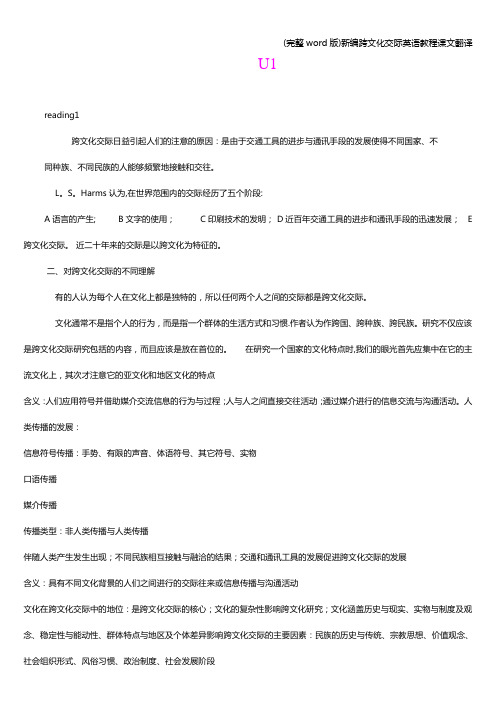
U1reading1跨文化交际日益引起人们的注意的原因:是由于交通工具的进步与通讯手段的发展使得不同国家、不同种族、不同民族的人能够频繁地接触和交往。
L。
S。
Harms认为,在世界范围内的交际经历了五个阶段:A语言的产生; B文字的使用; C印刷技术的发明; D近百年交通工具的进步和通讯手段的迅速发展; E 跨文化交际。
近二十年来的交际是以跨文化为特征的。
二、对跨文化交际的不同理解有的人认为每个人在文化上都是独特的,所以任何两个人之间的交际都是跨文化交际。
文化通常不是指个人的行为,而是指一个群体的生活方式和习惯.作者认为作跨国、跨种族、跨民族。
研究不仅应该是跨文化交际研究包括的内容,而且应该是放在首位的。
在研究一个国家的文化特点时,我们的眼光首先应集中在它的主流文化上,其次才注意它的亚文化和地区文化的特点含义:人们应用符号并借助媒介交流信息的行为与过程;人与人之间直接交往活动;通过媒介进行的信息交流与沟通活动。
人类传播的发展:信息符号传播:手势、有限的声音、体语符号、其它符号、实物口语传播媒介传播传播类型:非人类传播与人类传播伴随人类产生发生出现;不同民族相互接触与融洽的结果;交通和通讯工具的发展促进跨文化交际的发展含义:具有不同文化背景的人们之间进行的交际往来或信息传播与沟通活动文化在跨文化交际中的地位:是跨文化交际的核心;文化的复杂性影响跨文化研究;文化涵盖历史与现实、实物与制度及观念、稳定性与能动性、群体特点与地区及个体差异影响跨文化交际的主要因素:民族的历史与传统、宗教思想、价值观念、社会组织形式、风俗习惯、政治制度、社会发展阶段case1主角被埃及人邀请去家里吃丰盛的大餐,他用餐后说食物很好.在这种情况下,理查德错误可能是他选择赞美食物本身,而不是整个晚上,的食物.他的主人和女主人就好像他参加了一个艺术展,称赞这位艺术家说:多么美丽的你的照片。
在日本工作的时候他犯了一个错,开会的时候解释试图让大家明白每个人也许都会跟他一样以减轻罪过,结果又错了.相比之下,美国人强调个性价值和容易维护个体差异时,他们似乎理由与组织的目标或价值观冲突.在这种情况下:理查德…年代错误是在努力保护自己.case2对于学生来说,向老师提问很多问题是不尊重的,另一方面,提问一些跟老师说的无关的也如此,代表你没有听课。
新编跨文化交际英语教程(许力生) 课后翻译
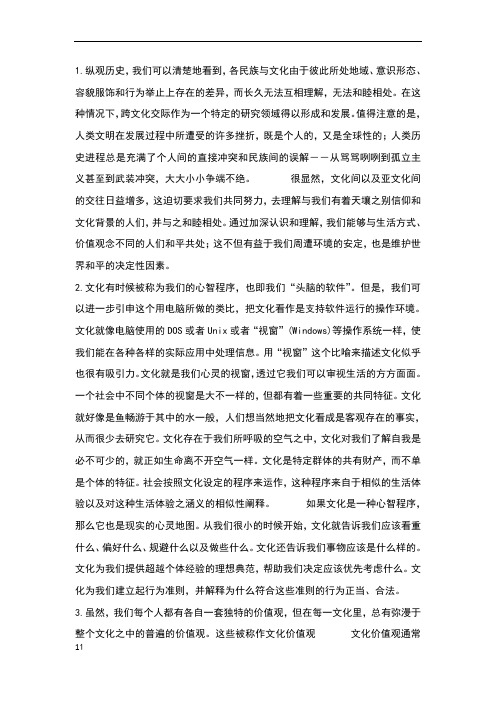
1.纵观历史,我们可以清楚地看到,各民族与文化由于彼此所处地域、意识形态、容貌服饰和行为举止上存在的差异,而长久无法互相理解,无法和睦相处。
在这种情况下,跨文化交际作为一个特定的研究领域得以形成和发展。
值得注意的是,人类文明在发展过程中所遭受的许多挫折,既是个人的,又是全球性的;人类历史进程总是充满了个人间的直接冲突和民族间的误解--从骂骂咧咧到孤立主义甚至到武装冲突,大大小小争端不绝。
很显然,文化间以及亚文化间的交往日益增多,这迫切要求我们共同努力,去理解与我们有着天壤之别信仰和文化背景的人们,并与之和睦相处。
通过加深认识和理解,我们能够与生活方式、价值观念不同的人们和平共处;这不但有益于我们周遭环境的安定,也是维护世界和平的决定性因素。
2.文化有时候被称为我们的心智程序,也即我们“头脑的软件”。
但是,我们可以进一步引申这个用电脑所做的类比,把文化看作是支持软件运行的操作环境。
文化就像电脑使用的DOS或者Unix或者“视窗”(Windows)等操作系统一样,使我们能在各种各样的实际应用中处理信息。
用“视窗”这个比喻来描述文化似乎也很有吸引力。
文化就是我们心灵的视窗,透过它我们可以审视生活的方方面面。
一个社会中不同个体的视窗是大不一样的,但都有着一些重要的共同特征。
文化就好像是鱼畅游于其中的水一般,人们想当然地把文化看成是客观存在的事实,从而很少去研究它。
文化存在于我们所呼吸的空气之中,文化对我们了解自我是必不可少的,就正如生命离不开空气一样。
文化是特定群体的共有财产,而不单是个体的特征。
社会按照文化设定的程序来运作,这种程序来自于相似的生活体验以及对这种生活体验之涵义的相似性阐释。
如果文化是一种心智程序,那么它也是现实的心灵地图。
从我们很小的时候开始,文化就告诉我们应该看重什么、偏好什么、规避什么以及做些什么。
文化还告诉我们事物应该是什么样的。
文化为我们提供超越个体经验的理想典范,帮助我们决定应该优先考虑什么。
新编跨文化交际英语教程1-6单元翻译(Word可编辑版)

纵观历史,我们可以清楚地看到,人们由于彼此所处地域、意识形态、容貌服饰和行为举止上存在的差异,而长久无法互相理解、无法和睦相处。
在这种情况下,跨文化交际作为一个特定的研究领域得以形成和发展。
值得注意的是, 人类文明在发展过程中所遭受的许多挫折, 既是个人的, 又是全球性的: 人类历史进程总是充满了个人问的直接冲突和民族间的误解一一从骂骂咧咧到孤立主义直至到武装冲突, 大大小小争端不绝。
很显然, 文化间以及亚文化问的交往比以前多了, 这迫切要求我们共同努力, 去理解有着不同信仰和文化背景的人们, 并与之和睦相处。
通过加深认识和理解, 我们能够与生活方式、价值观念不同的人们和平共处: 这不但有益于我们周遭环境的安定, 也是维护世界和平的决定性因素。
Translation Unit 2文化有时候被称为我们的心智程序, 我们“头脑的软件”。
但是, 我们可以进一步引中这个用电脑所做的类比, 把文化看作是支持运行的操作环境。
文化就像电脑使用的Dos 或者unix 或者“视窗”(windows) 等操作系统一样, 使我们能在各种各样的实际应用中处理信息。
用“视窗”这个比喻来描述文化似乎也很有吸引力。
文化就是我们心灵的视窗,透过它我们审视生活的方方面面。
一个社会中不同个体的视窗是不大一样的, 但都有着一些重要的共同特征。
文化就好像是鱼畅游于其中的水一般, 人们想当然地把文化看成是客观存在的事实, 因而很少去研究它。
文化存在于我们所呼吸的空气之中, 文化对于我们了解我们自身之为何物是必不可少的, 就正如生命离不开空气一样。
文化是特定群体的共有财产, 而不单是个体的特征。
社会按照文化设定的程序运作, 这种程序来自于相似的生活体验以及对这种生活体验之含义的相似阐释。
如果文化是一种心智程序, 那么它也是现实的心灵地图。
从我们很小的时候开始, 文化就告诉我们应该看重什么、偏好什么、规避什么和做些什么, 文化还告诉我们事物应该是什么样。
- 1、下载文档前请自行甄别文档内容的完整性,平台不提供额外的编辑、内容补充、找答案等附加服务。
- 2、"仅部分预览"的文档,不可在线预览部分如存在完整性等问题,可反馈申请退款(可完整预览的文档不适用该条件!)。
- 3、如文档侵犯您的权益,请联系客服反馈,我们会尽快为您处理(人工客服工作时间:9:00-18:30)。
第一部分交际英语全翻译版共212题1.以下内容已包含2019年版新大纲的9套模拟题,45个标成红色的题目,要重点复习.2.根据4月考试最终结果将次重点33个标注为蓝色(蓝色为4月除红色外出现的考题)。
此部分单词简单,情景对话,多温习几次,容易突击消化.考试5题15分,尽量拿满分.内部资料请勿传播(如传播将停止更新服务),复习本资料无需看其他资料,基础较差的温习标注红色的45题即可。
一些同学的基础很差,直接看英语无法掌握,现在将全部题目翻译为中文,如遇到不能理解的题目可请教群主。
1.--Have a cup of tea, ________ ? --Thanks a lot. 你需要来杯茶吗?--非常感谢。
A don’t youB haven’t youC shall meD will you2.-- ________? --He is not very well. 他怎么样?他不是很好。
A Who is heB What is heC How is heD Who he is3.—Why didn’t you come to my birth day party yesterday? -- ________.昨天为什么不来参加我的生日晚会?不好意思,我太太出了个交通事故A Excuse me, my friend sent me a flowerB Fine, I never go to birthday partiesC Well, I don’t like birthday partiesD Sorry, but my wife had a car accident4.—This box is too heavy for me to carry upstairs. 这个盒子对我来说太重了,搬不到楼上去--_______--让我帮你吧A You may ask for helpB I’ll give you a handC Please do me a favorD I’d come to help5. -Could I ask you a rather personal question? 我可以问您一个私人问题吗?-Of course, _________.当然可以,开始A good ideaB that’s rightC never mindD go aheadKey: DCDBD6.—Oh, dear! I’ve just broken a window..噢天啊,我刚刚打破了一扇窗户。
-- ________ 不要紧。
A GreatB Don’t worry /Never mindC That’s fineD Not at all7. —Sorry. I have taken your sports shoes by mistake.抱歉,我错拿了你的运动鞋。
-- ________. 没关系.A That’s rightB You’re welcomeC It doesn’t matterD All right8. -That’s a beautiful dress you have on!你穿的这件裙子很漂亮!- ________.噢,谢谢,我昨天买的A Oh, thanks. I got it yesterdayB Sorry, it’s too cheapC You can have itD See you later9. -How do I get to the cinema?- ________.能告诉我电影院怎么走吗?沿着这条街,然后向左拐A It’s very far.B Yes, there is a cinema near here.C It’s well known.D Go down this street and turn left.10. -If you like I can mail this letter for you? 您会喜欢我写封信给你吗?- ________ .你真好(固定搭配)A That’s very kind of youB You are so kindC Please give me a handD You are great Key: BCADA11. -David injured his leg playing football yesterday.大卫昨天踢球时腿受伤了-Really? ________?真的吗?那怎么发生的啊?A Who did thatB What’s wrong with himC How did that happenD Why was he so careless12.-Must I be home before seven? 我必须在7点之前回来吗?- _____ ___.不,不需要(肯定回答Yes,you must.,否定回答No,you need not)A No, you needn’tB No, you mustn’tC Yes, you willD No, you won’t13. -Shall I drive you to the railway station? 要我开车送你去火车站吗?-Oh, don’t bother about it.I’ll take a taxi. .哦。
不要麻烦,我打个出租。
-Well, ________!恩,祝你旅途愉快。
-Thank you and good-bye! 谢谢,拜拜。
A come onB helpC have it checked upD have a nice trip14. -I’m terribly sorry that I’ve spilled some coffee on the carpet. 很抱歉,我溅了些咖啡在地毯上。
-________ . 没关系A. SorryB. It doesn’t matterC. That’s rightD. D on’t mention it15. -Hi, is Mary there, please?- ________请问,Mary在吗?--请别挂断,我去叫她A Hold on. I’ll get her.B No, she isn’t here.C Yes, she lives here.D Yes, what do you want?Key: CADBA16. -It’s rather cold in here. Do you mind if I close the window? - ________.这里相当冷,你介意我把窗关上吗?--不介意,去关上吧。
(问介意用YES表示介意或NO)A Yes, pleaseB No, go aheadC Sure, pleaseD I don’t like it17.-Which sweater do you like better?你喜欢哪件毛衣?- ________.我无法决定A Good ideaB Yes, it’s niceC Yes, pleaseD I can’t decide18.-How clever your little son is! - ________. 你小儿子真聪明!-谢谢。
A I don’t think soB In fact he isn’tC Thank youD You are not true19.-Medam,do all the buses go downtown?女士,请问,是不是所有的公交车都开往市区?- ________. 对不起,我也不是本地人A Wow, you got the ideaB No, never mindC pretty well, I guessD Sorry, I’m new here20.-Could I speak to Don Watkins, please?我能和Don Watkins说话吗?- ________ 我就是。
(电话用语)A I’m listening.B Oh, how are you?C Speaking ,please.D I’m Don.Key: BDCDC21.-Tomorrow is my birthday.- ________ 明天是我的生日。
-祝你生日快乐。
A Oh, I have no ideaB I’m glad you like it.C Many happy returns of the day!D You must be very happy.22.-Did you win the 100 metre race? 你赢了百米比赛吗?-Yes, I did. 是的。
-Really? 真的?- ________.没错。
A CongratulationsB Best wishesC Good luckD Right23.-You speak English very good.- ________. .你英语说的非常好。
--.谢谢A No, not at allB My English is not goodC Thank youD No, you speak better than I24.-I was worried about my maths, but Mr. Brown gave me an A. - ________我很担心我的数学,但是布朗先生给了我一个A。
--祝贺你!真不容易。
A Don’t worry about it.B Congratulations! That’s a difficult course.C Mr. Brown is very good.D Good luck to you!25.-Thanks for your help. - ________.谢谢您的帮助--这是我的荣幸。
A My pleasureB Never mindC Quite rightD Don’t thank meK ey: CDCBA26.-Hello, I’m Harry Potter.你好,我是Harry Potter.-Hello, my name is Charles Green, but ________. 你好,我叫Charles Green,但是请叫我Charles。
A call my CharlesB call me at CharlesC call me CharlesD call Charles me27.—I’m sorry to trouble you. Can I borrow a pen, please?很抱歉打搅您,我能借用下您的笔吗?-- ________.当然!在这儿A Yes, you canB Certainly! It is hereC She’s welcomeD Thank you28. -I was born in Boston, but I studied in New York. ________?我出生在波士顿,但在纽约上学,你呢-I was born in New York, but studied in Boston.我出生在纽约,在波士顿上学。
